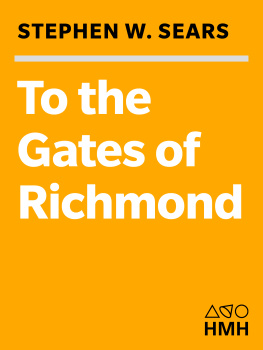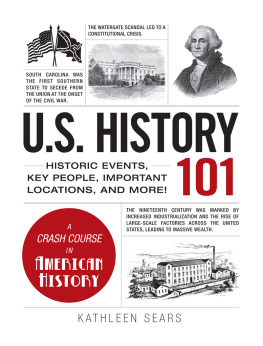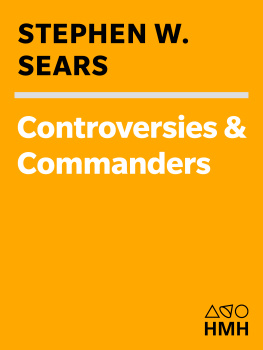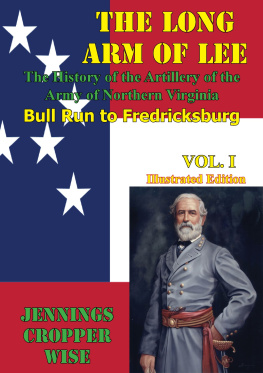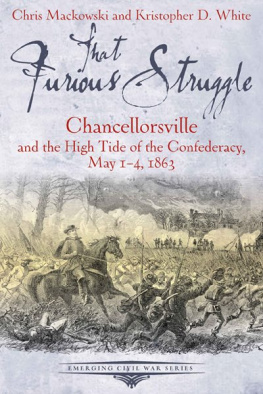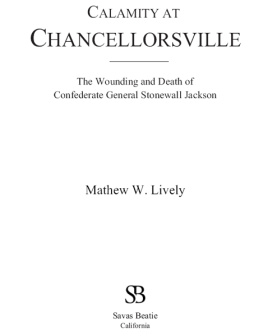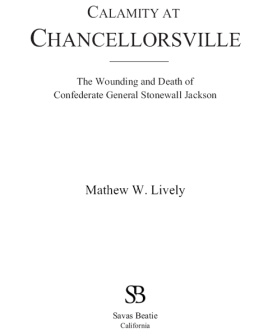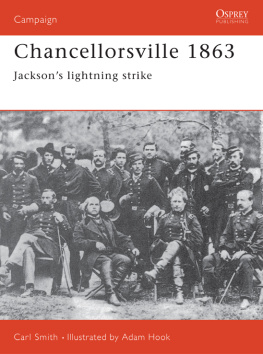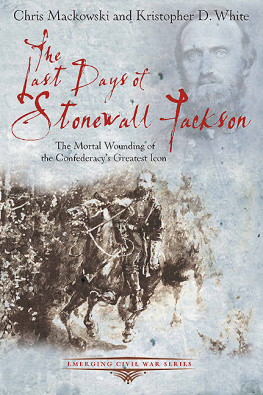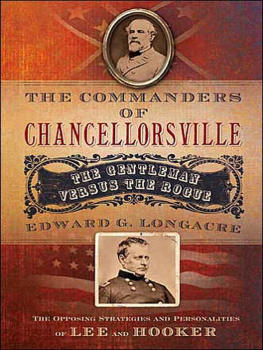Sears - Chancellorsville
Here you can read online Sears - Chancellorsville full text of the book (entire story) in english for free. Download pdf and epub, get meaning, cover and reviews about this ebook. City: Boston;New York;Stany Zjednoczone, year: 1996, publisher: Houghton Mifflin Harcourt, genre: History. Description of the work, (preface) as well as reviews are available. Best literature library LitArk.com created for fans of good reading and offers a wide selection of genres:
Romance novel
Science fiction
Adventure
Detective
Science
History
Home and family
Prose
Art
Politics
Computer
Non-fiction
Religion
Business
Children
Humor
Choose a favorite category and find really read worthwhile books. Enjoy immersion in the world of imagination, feel the emotions of the characters or learn something new for yourself, make an fascinating discovery.
Chancellorsville: summary, description and annotation
We offer to read an annotation, description, summary or preface (depends on what the author of the book "Chancellorsville" wrote himself). If you haven't found the necessary information about the book — write in the comments, we will try to find it.
Sears describes the series of controversial events that define this crucial battle, including General Robert E. Lees radical decision to divide his small armya violation of basic military rulessending Stonewall Jackson on his famous march around the Union army flank. Jacksons deathaccidentally shot by one of his own soldiersis one of the many fascinating stories included in this definitive account of the battle of Chancellorsville.
Sears: author's other books
Who wrote Chancellorsville? Find out the surname, the name of the author of the book and a list of all author's works by series.
Chancellorsville — read online for free the complete book (whole text) full work
Below is the text of the book, divided by pages. System saving the place of the last page read, allows you to conveniently read the book "Chancellorsville" online for free, without having to search again every time where you left off. Put a bookmark, and you can go to the page where you finished reading at any time.
Font size:
Interval:
Bookmark:
Copyright 1996 by Stephen W. Sears
All rights reserved
For information about permission to reproduce selections from this book, write to Permissions, Houghton Mifflin Harcourt Publishing Company, 215 Park Avenue South, New York, New York 10003.
www.hmhco.com
The Library of Congress has cataloged the print edition as follows:
Sears, Stephen W.
Chancellorsville / Stephen W. Sears.
p. cm.
Includes bibliographical references and index.
ISBN 0-395-63417-2
1. Chancellorsville (Va.), Battle of, 1863. I. Title.
E 475.35. S 43 1996
973.7'33dc20 96-31220
CIP
e ISBN 978-0-547-52585-3
v1.1214
For Sally, once again and always
The Eastern Theater
Battle of Kellys FordMarch 17, 1863
The Rappahannock Front
Hookers Turning MovementApril 2729
Seizing a BridgeheadApril 29
March to ChancellorsvilleApril 30
Battle of May 1
Jacksons Flank MarchMay 2
Jacksons AttackMay 2
Jackson VictoriousMay 2/
Jacksons WoundingMay 2
ChancellorsvilleMay 3, 6:00 A.M.
ChancellorsvilleMay 3, 7:30 A.M.
ChancellorsvilleMay 3, 9:00 A.M.
ChancellorsvilleMay 3, 9:30 A.M.
Maryes HeightsMay 3
ChancellorsvilleMay 3, 10:00 A.M.
Stonemans RaidApril 29May 8
Salem ChurchMay 3
Battle for Bankss FordMay 4
Maps by George Skoch
C HANCELLORSVILLE holds a unique place on the roll of Americas great battles. It was the most complex campaign of the Civil War. It witnessed the most intense and concentrated few hours of fighting of the entire war. It ranks as the most remarkable of Robert E. Lees victoriesand the most disheartening of Union defeats. And for the Southern Confederacy the fate of Stonewall Jackson turned Chancellorsville into the most hollow of victories.
Late April of 1863 saw the Union aggressively on the march in both the western and eastern theaters of war. In the West, U.S. Grant opened his climactic campaign against the Mississippi citadel of Vicksburg. In the East, the start of Joe Hookers much-heralded campaign against Lee in northern Virginia riveted attention all across the two nations at war. Hookers campaign plan was inspireddecidedly the best strategy conceived in any of the campaigns ever set on foot against us, said Confederate soldier and historian Porter Alexanderand his opening maneuvers were brilliantly successful. After the war, when he looked back on his time of command at Chancellorsville, Joe Hooker could only shake his head in disbelief. I won greater success on many fields in the war, he wrote, but nowhere did I deserve it half so much....
General Hooker may be excused that particular conceit. He had prepared the Army of the Potomac well and himself well, and aided by an intelligence coup he put his army in a position to fight the battle exactly as he wanted. Calculated on that basis, he might rightfully have expected victory to follow. When the myths that have long obscured his generalship at Chancellorsville are cleared away, it becomes plain that however much Joe Hooker sinned, on this battlefield he was more sinned against, by inept lieutenants and simple happenstance.
General Lee, on the other hand, snatched victory from impending defeat through the courage of his absolute conviction that the men of his Army of Northern Virginia could not be beaten by any number or combination of Yankee soldiers. He believed these men, and their generals, could do whatever he asked of them, however bold. And bold he was in maneuvering and fighting in the tangled Wilderness around the Chancellorsville crossroads, and at least on this battlefield he was proven right.
Primary sources previously unavailable or unused cast a great deal of new light on this campaign. These sources range from General Hookers papers to many score letters and diaries of officers and men of both armies. In later years men who fought at Chancellorsville (and historians who listened to them) tended to paint the scene with their own tones. The intent of this narrative history is to restore campaign and battle to its original colors.
Nearly 200,000 men fought here, and nearly one in six was a casualty. When it was over, the Yankees who had crossed the Rappahannock with such high expectations ten days earlier were back north of the river, licking their wounds. General Lee had surely won the battle, a North Carolina soldier observed, but he wondered to what purpose. Here were the two armies back in their old camps on opposite sides of the river, very much as if nothing had happened, and how much more does it look like peace than before....
Robert E. Lee was unsatisfied as well. He would bury the dead and reorganize his battered army and set off northward, toward Pennsylvania, to capitalize on what he had won so spectacularly on the great battlefield of Chancellorsville.
T HE TWO GENERALS were ushered into the presidents office on the second floor of the east wing of the White House in midafternoon. It was Tuesday, December 30, 1862, and the purpose of their interview with Mr. Lincoln was, to say the least, highly irregular. It was their considered opinion that General Burnside was about to lead the Army of the Potomac to disaster, and they saw it as their duty to prevent this from happening.
The two made a decidedly odd pairing. Brigadier General John Newton looked the very picture of a professional soldier. He was forty, tall and stiffly erect and with a determined look about him. Descended from a First Family of Virginia, Newton had graduated from West Point second in class twenty years before, entered the elite Corps of Engineers, and stayed resolutely at his post when Virginia left the Union in 1861. In the Army of the Potomac he had compiled a careful combat record, rising to the command of a division in William F. Smiths Sixth Corps of William B. Franklins Left Grand Division. While Newton was not entirely unfamiliar with the ways of Washingtonhis father had been a congressman from Virginia for twenty-nine yearshe would express himself uncomfortable about approaching the president this way. Indeed, when he came up to the capital that morning from army headquarters on the Rappahannock, General Newton had not had the least thought of going anywhere near the White House.
His companion, by contrast, was quite at home in this setting. Brigadier General John Cochrane, commander of a brigade under Newton, forty-nine years old and entirely lacking in soldierly bearing, was a political operator to his fingertips. Where John Newton was F.F.V., John Cochrane was Mozart Hall politico. He had served two terms as a congressman from New York City just before the war. A conservative Democrat, he raised a regiment in 1861 and rode into the army on the coattails of the Republican administrations call for bipartisan support of the war effort. Cochrane soon enough rose from political colonel to political general and proved adept at wire-pulling in Washington. As recently as October he had been sent to the capital by the then commanding general of the Army of the Potomac, George B. McClellan, to lobby for McClellans reappointment as general-in-chief of the Union armies. In this cause Cochrane enlisted a Cabinet secretary, Salmon P. Chase, and the countrys largest newspaper, the New York Herald, and spoke directly to Mr. Lincoln on the subject. In the event, his efforts were unavailing, and within a month McClellan was displaced as army commander by Ambrose Burnside. Now, on this December afternoon call at the White House, Cochrane, with Newton in tow, was conspiring to see Burnside displaced as army commander.
Cochrane and Newton had not concocted this intrigue by themselves. They merely represented the latestand boldestevidence of a generals revolt in the Army of the Potomac aimed at Burnsides overthrow. The two ringleaders of the revolt were Cochranes and Newtons immediate superiors, Major Generals William Franklin and William Smith.
Next pageFont size:
Interval:
Bookmark:
Similar books «Chancellorsville»
Look at similar books to Chancellorsville. We have selected literature similar in name and meaning in the hope of providing readers with more options to find new, interesting, not yet read works.
Discussion, reviews of the book Chancellorsville and just readers' own opinions. Leave your comments, write what you think about the work, its meaning or the main characters. Specify what exactly you liked and what you didn't like, and why you think so.


